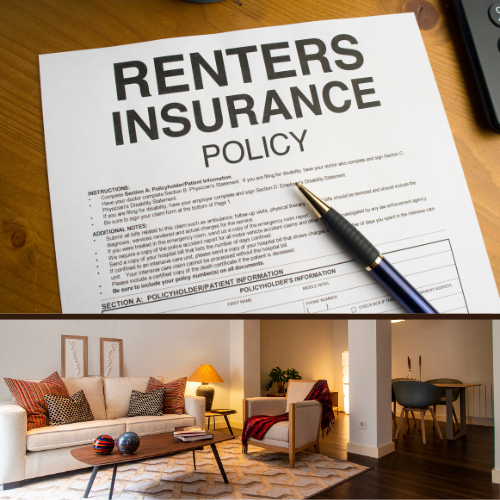Renter’s Insurance in Miles City, MT

Renter’s Insurance provides valuable protection for your belongings and financial security
With approximately 1,273 renter-occupied housing units in Miles City, many tenants rely on this coverage to protect their possessions against unexpected events like theft, fire, and liability claims, ensuring their financial stability remains intact
Many people mistakenly believe that their landlord’s insurance policy will cover their personal belongings
Landlord insurance only covers the building structure and any property owned by the landlord

Landlord’s insurance excludes renter’s belongings and liability
Renter’s insurance does protect the tenants’ personal possessions and provides liability coverage for renters
This is why having your own renters insurance policy is important for protecting your belongings and financial well-being
Understanding Renter’s Insurance in Miles City, MT

Renter’s Insurance is a Tenant’s Safety Net
Renters insurance actively protects renters in apartments, houses, condos, and other dwellings
- This coverage:
- protects your belongings,
- provides liability protection, and
- covers living expenses if your rental becomes uninhabitable
Lets look at the coverages that a renter’s insurance policy offers
Renter’s Insurance Coverages
There are four coverages that are typically offered under a renter’s insurance policy
- The Coverages are:
- Personal Property Coverage
- Liability Coverage
- Additional Living Expenses
- Medical Payments Coverage
Personal Property Coverage
Personal property coverage (Coverage C) protects your belongings from damage or loss caused by specific covered events, or ‘named perils’
These items include furniture, electronics, clothing, kitchenware, and other personal possessions, whether they are inside your rental unit or temporarily outside (e.g., in a storage unit or while traveling
Coverage for High-Value Items
Items like jewelry, art, and collectibles may have sub-limits within the policy (e.g., $1,500 for jewelry)
To fully protect these valuables, you can “schedule” them by adding an endorsement or rider for additional coverage
Additional Features
- Off-Premises Coverage: Personal property coverage extends to belongings outside your home
- For instance, if your laptop is stolen while traveling or your friend’s bike is stolen from your apartment while they’re visiting, these losses may be covered
- Storage Units: Belongings stored in self-storage units are often covered but may have lower limits compared to items kept at your primary residence
- The Renter’s insurance deductible only applies to the personal property coverage
What It Doesn’t Cover
- Personal property coverage has limitations. Risks that are not covered include:
- Damage caused by floods or earthquakes (requires separate policies)
- Normal wear and tear
- Losses exceeding policy limits or sub-limits
- Items owned by roommates unless they are listed on the policy
Liability Coverage
Liability coverage protects you if someone is injured in your rental or if you accidentally damage someone else’s property
Liability coverage in a renter’s insurance policy offers more extensive protection than you might initially think:
- Coverage limits typically start at $100,000, but can be increased to $300,000 (Recommended frequently) or $500,000 depending on your needs
- It covers both the cost of defending you in court and any court awards, up to the policy limit
- Liability coverage extends beyond your rental unit.
- It can protect you if you accidentally cause damage or injury elsewhere
- Liability coverage can protect you in various scenarios, such as if your dog bites someone, a guest slips and falls in your apartment, or you accidentally damage a friend’s property
- While not legally required, many landlords may insist on tenants having liability coverage as part of their lease agreements
Additional Features
- In liability claims, such as when a guest is injured in your apartment, the insurance company typically covers the full amount of the claim without requiring you to pay a deductible first
- For those who need extra protection, an umbrella policy can provide additional liability coverage beyond the limits of your renters insurance
What it Doesn’t Cover
Renters liability insurance, while providing important protection, has several exclusions
Here are 8 scenarios typically not covered by renters liability insurance:

Renters liability insurance does not cover these 8 scenarios
- Intentional acts: Deliberate harm or damage caused by the policyholder is not covered.
- Business-related claims: Issues arising from home-based businesses require separate commercial policies.
- Car accidents: Liability from auto accidents falls under auto insurance, not renters insurance.
- Damage to your own belongings: This falls under personal property coverage, not liability.
- Injuries in common areas: These are typically covered by the landlord’s insurance.
- Certain dog breeds: Many insurers exclude coverage for specific dog breeds, particularly pit bull-type or bully breeds.
- Exotic pets: Liability related to exotic animals like reptiles or monkeys may not be covered.
- Damage to the rental property: Most policies exclude coverage for property damage done to the rented property by the policyholder
Additional Living Expenses
Additional Living Expenses (ALE) coverage in a renter’s insurance policy serves to protect you financially if you’re temporarily displaced from your rental home due to a covered event
The Purpose of ALE is To
- Cover increased living costs when your rental becomes uninhabitable
- Help maintain your standard of living during displacement
- Reimburse the difference between normal expenses and temporary living costs
Typical ALE Covered Expenses
- Hotel or temporary housing costs
- Increased food expenses (e.g., restaurant meals)
- Additional transportation costs
- Pet boarding fees
- Storage fees for belongings
Additional Features
- There are some important points about Additional Living Expenses (ALE) coverage that you should know:
- Time Limits: ALE coverage typically has a time limit, often up to 24 months or more, depending on the policy and location.
- Percentage-Based Limits: ALE coverage is often limited to a percentage of your personal property coverage
- Reimbursement Basis: ALE only covers the difference between your normal living expenses and your temporary increased costs, not the full amount of your temporary expenses.
- Documentation: Keeping detailed records and receipts is important for reimbursement. Without receipts, you may not receive payment.
- Covered Perils: ALE only applies when you’re displaced due to a peril covered by your policy, such as fire, windstorm, or burst pipes
- Deductibles: ALE coverage typically does not require a deductible. However, it’s always important to check your specific policy to confirm
What ALE Doesn’t Cover
- ALE only covers additional costs beyond what you would typically spend. Expenses not covered include:
- Expenses above the policy limit
- Non-essential upgrades or luxury accommodations
- Costs that mirror regular living expenses
- Your usual rent payment
- Normal utility bills (electricity, water, gas, internet)
- Normal level of grocery expenses
- Costs due to pain and suffering
Medial Payments Coverage
Medical payments coverage pays for minor medical expenses of guests injured in your rental, regardless of fault
It typically handles immediate costs like emergency room visits and follow-up care, often with limits ranging from $1,000 to $5,000
This coverage helps prevent potential lawsuits by quickly addressing small medical claims and is separate from liability coverage
Additional Features
- This coverage is designed for minor medical claims and can help prevent potential lawsuits by addressing small medical expenses quickly.
- Unlike liability coverage, medical payments coverage does not require proving fault or legal responsibility.
- It does not cover injuries to you, your family members, or people who live with you.
- It’s intended for guests and visitors
What it Doesn’t Cover
- Injuries to you or your family members
- Injuries to people who live with you
- Injuries to individuals hired to work for you or on your behalf
- Injuries intentionally caused by the insured
Renters insurance policies protect against specific risks; let’s explore them
Understanding the covered perils helps renters know when their insurance coverage will apply
Risks Covered by Renters Insurance in Miles City, MT

Renters insurance is typically a named peril policy
This means it covers specific risks or perils that are explicitly listed in the policy
Standard renters insurance policies usually cover the following named perils:
| Fire and smoke | Lightning |
| Theft | Explosion |
| Vandalism | Falling objects |
| Water damage from plumbing issues | Weight of ice, snow, or sleet |
| Windstorm or hail | Riot or civil commotion |
In named peril policies, policyholders must prove the loss resulted from a covered peril
Renters insurance typically covers named perils, but some insurers offer all-risk aka “open peril” options for personal property coverage
All Risk Policies
These policies provide broader protection, covering all perils except those specifically excluded in the policy
Coverage can vary between policies and insurers
Even with an open peril option in a renter’s insurance policy, certain exclusions typically apply
Exclusions
Policies exclude damage from floods, earthquakes, and earth movements such as sinkholes or landslides
Insurers also exclude intentional acts by the policyholder, negligence, and normal wear and tear.
Additionally, policies do not cover damage from power failures, war, nuclear hazards, or government actions
Protecting the Value of Your Stuff with Renters Insurance in Miles City, MT

Renters insurance policies offer two types of valuation for personal property coverage
- Actual Cash Value (ACV): This method pays for the depreciated value of your belongings at the time of loss. For example, if you bought a sofa for $1,000 five years ago, its actual cash value today might only be $600 due to depreciation.
- Replacement Cost Value (RCV): This method pays the full cost to replace your damaged or stolen items with new ones of similar kind and quality. Using the same example, if your five-year-old sofa is damaged, RCV coverage would pay the current cost of replacing it with a new equivalent sofa, which could be $1,200
Note: RCV coverage typically costs more than ACV coverage because it provides higher payouts for claims.
Some insurance companies offer RCV as a standard feature, while others may provide it as an optional upgrade
When choosing between ACV and RCV, consider the value of your belongings and your budget.
RCV offers more comprehensive protection but comes at a higher premium, while ACV is cheaper but may leave you with out-of-pocket expenses when replacing items
The Cost of Renters Insurance in Miles City, MT: What to Expect

The Financial Footprint
The cost of renters insurance varies based on several factors, including the amount of coverage, deductible, location, credit history, and claims history
On average, renters insurance costs around $12 to $20 per month nationally, or approximately $148 to $240 per year
In Montana, the average cost is lower, at approximately $131 per year or about $11 per month
The Smart Choice
Despite potential drawbacks like premiums and deductibles, renters insurance offers valuable protection at a reasonable cost
- Here’s why it’s generally a smart choice for most tenants:
- It protects your personal belongings against theft, fire, and other covered perils
- It provides liability coverage if someone is injured in your rental unit or if you accidentally damage someone else’s property
- It can help pay for temporary living expenses if your rental becomes uninhabitable due to a covered event
- It offers coverage for your belongings even when you’re away from home
- It’s relatively affordable, with typical policies costing between $11 to $20 per month
- It can provide optional identity theft protection
- It gives tenants peace of mind, knowing their assets are protected
Renters insurance protects personal belongings and provides liability coverage, offering peace of mind at an affordable cost
It’s a smart choice for tenants because landlord insurance doesn’t cover your personal items
Armor Insurance Agency

If you liked this article you can find more HERE:
Explore the Advantages of Renters Insurance Today
Call: (406) 416-1096
We are an equal opportunity provider

Leave a Reply